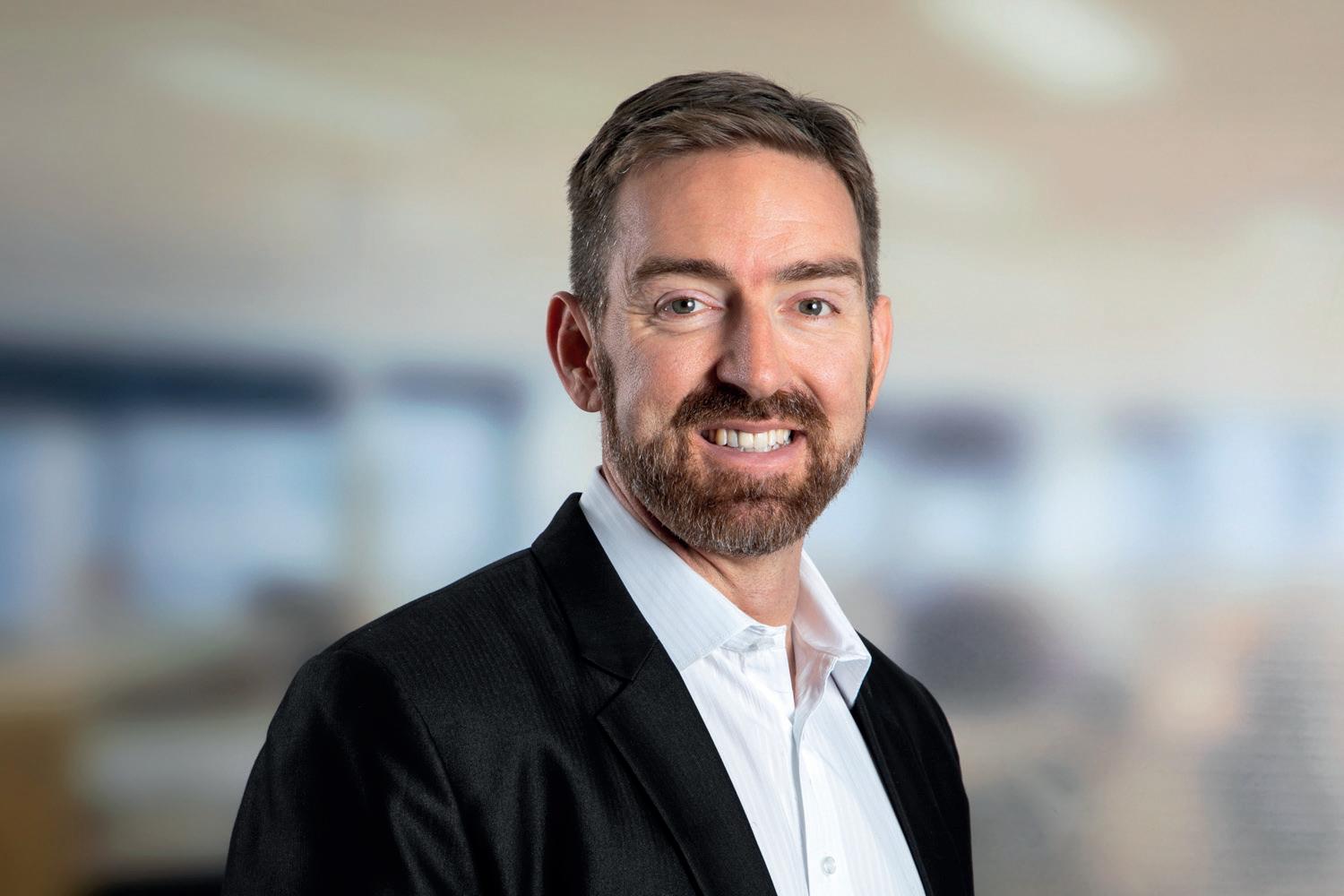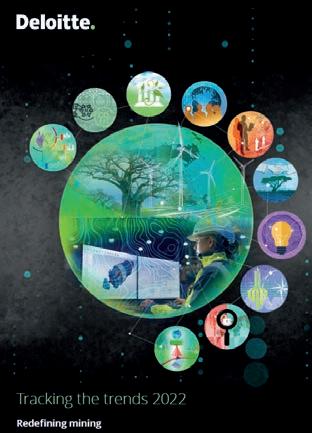
7 minute read
INDUSTRY OUTLOOK
TRACKING THE CULTURAL SHIFT IN AUSTRALIAN MINING
EVOLVING MINING BUSINESS MODELS CAN OFTEN MANIFEST AS UPDATED INVESTMENTS AND VENTURES TO GLOBAL CLIMATE-CHANGE COMMITMENTS.
IN PART TWO OF A SERIES INSPIRED BY DELOITTE’S TRACKING THE TRENDS 2022 REPORT, AUSTRALIAN MINING EXAMINES A MOVEMENT TOWARDS REIMAGINING WORK TO ALIGN WITH SOCIAL PURPOSE.
Over the last 14 years, Deloitte’s annual Tracking the Trends report has sought to monitor changes in the Australian mining industry, defining the most important issues that will impact companies and individuals over the coming 12–18 months.
Released in February, the 2022 report places strong focus on topics concerning low-carbon targets, effective company structure, and attracting workers in a competitive labour market.
In its latest assessment, Deloitte suggests a growing sense of urgency among miners to meet sustainability commitments and retain employee engagement. This has resulted in a mass restructure of value chains, and a movement towards reimagining work to align with social purpose.
As Deloitte points out, these growing changes in sentiment bring a rare opportunity for business leaders to investigate where out-dated practices could benefit from change. These new approaches could utilise Industry 4.0 and digitalisation, offering data-driven solutions to employee fatigue, or pivot the way investors value green-energy alternatives.
Steven Walsh is the national mining and metals leader and partner in the consulting division of Deloitte Australia. He is a trusted voice on innovative enterprise systems and specialises in the topic of how people and technology can support broader organisations.
Walsh told Australian Mining that paying attention to which voices are steering the conversation around this progression was key, noting the importance of integrating diverse perspectives across the board.
“Getting in touch with the culture of an organisation requires a shift in approach to authentically listening and continually sensing, gathering feedback and adapting,” he said.
“This will ensure the most important aspects of the organisation’s aspirations are being realised, consciously addressing bias and wiring in inclusive practices that support a diverse workforce is paramount.”
Showing up for change In the report, Deloitte references the evolving priorities of consumers, suppliers and investors to “spur new business models”. This often manifests as a reworked company portfolio, publicly relating updated investments and ventures to global climate-change commitments.
“The speed of portfolio realignment will depend heavily on the make-up of the current assets and the pressure the company is feeling from its key stakeholders,” Walsh said.
“The timing for every company will be different and that will determine which remain in fossil fuels and which transition to other operations.”
Circular value chains are also cited as a critical new approach, as companies aim to minimise their environmental impact through adopting reprocessing, metals recycling, and urban mining initiatives.
A key question remains, however, regarding how to best coordinate a transition to clean energy while still fulfilling existing material demand. Walsh suggested this gradual handover would naturally occur under investor and consumer pressure, leaving traditional fossil fuel production less profitable over time.
“Deloitte works with many mining companies, from global diversified organisations to mid-tier single-asset operations,” he said. “This work on climate has mostly focused around understanding the timing and scale of emerging risks, developing a roadmap to effectively mitigate the downsides and secure the opportunities.”
“We now start to see many of these clients move to the implementation strategies, investing in both portfolio realignment and major capital allocation assessments.”

Connecting with social purpose The increasingly competitive labour market is just one lasting effect of the COVID pandemic, and it has come about as workers seek employment better suited to their needs and qualifications.
As a result, Deloitte said recruiters must “re-evaluate their employee value proposition and transform ways of working”. Trend five in the 2022 report – Evolving mining’s world of work – stipulates that the fundamental step towards meeting these demands is a two-fold commitment to updated social norms.
The first commitment is transitioning to green energy as a primary pillar of the mining economy, and the second is further implementing diversity, equity, and inclusion across the workforce.
“A current topic which needs to remain front of mind – and not be lost back into ‘old ways of working’ – is the experience that organisations are creating for diverse talent,” Walsh explained.
“There is attention in the industry at the moment on understanding the challenges that diverse talent has faced; this isn’t a quick fix and needs intense focus in order to address systemic challenges and create an environment where everyone can bring their best selves to work.”
By aligning with widespread sentiment concerning the urgency of climate action, companies stand to cultivate a more attractive launchpad for diverse talent. Deloitte’s report refers to this as “unleashing individual and team potential” by accounting for social motivations in their employment portfolio. This concept is backed by Walsh’s comments.
“Organisations should continue to challenge assumptions and

STEVEN WALSH, NATIONAL MINING AND METALS LEADER AND PARTNER IN THE CONSULTING DIVISION OF DELOITTE AUSTRALIA.
mandates on where talent can be found,” he said.
“Instead of creating rigidity in location policies and making recruitment in tight markets even harder, they should explore how global talent can be connected into a virtual team.”
This new approach might look like defining a social impact agenda, integrating new training and HR tools, reducing barriers for underrepresented groups, and maintaining flexible working arrangements.
Additionally, the report explores emerging role types not previously associated with the mining industry. This comes with an intentionality around the interconnectedness of humans and technology, exploring the overlap between data analysis and industry communications.
“Mining companies looking to capitalise on data and digital trends are considering the redesign of work as they move toward more integrated operations centres, also known as nerve centres,” Walsh said.
“Considering what skills and roles are needed to support the nerve centres to achieve the desired business outcomes is key.
“This includes understanding whether they will build these capabilities in-house or outsource them to external partners.
“With a greater shift to data at the edge, we anticipate that teams delivering maintenance and geoscience services will see their capabilities drastically evolve.
“We anticipate the increased reliance on roles such as team performance scientists, safety experience architects, intelligent asset care leads, and specialist rock engineers.”
The report places emphasis on viewing innovation as a tangible objective, urging players in the sector to evaluate what disruptions to the status quo might truly mean in their workplace.
It suggests that a necessary shift in where the industry places value – while still maintaining reasonable profit margins – may assist in generating long-term sustainability. In practice, this will mean companies should aim to become “truly agile” in a forward-thinking approach, utilising the differences of background and thinking of a diverse employee pool.
Empowering ground-level decision-makers In trend eight – Unlocking value through integrated operations – Deloitte advises that insights gained through interfacing with technology may be the key to unlocking greater business potential.
According to the report, the traditional value chain places limitations on authority and the ability for lower-level employees to initiate change, creating a compartmentalised ecosystem of work that draws focus away from collaboration.
According to Walsh, an industrywide shift in business structure would benefit organisations more holistically.
“As the world of work continues to evolve at an ever-increasing rate, leaders need to embrace innovation and more adaptable ways of working,” he said.
“Organisations must resist the temptation to over govern or ‘engineer’ the work, squashing the benefits of innovation and adaptability that they were originally seeking.”
Deloitte suggests that leaning towards new frameworks of business hierarchy, clarifying the responsibilities of each role, and acknowledging the benefits of flexibility to meet individual needs are the next steps in maximising employee potential.
“We are seeing a number of organisations start to explore what the ‘return to the office’ looks like,” Walsh said.
“Virtual working for some roles and types of work has been proven to have a positive impact on productivity and there are continuing benefits to be had.
“Virtual ways of working also open up opportunities to more diverse talent groups rather than shifting focus back to site-based roles on rigid rosters, which then limits the talent market.”
The overarching sentiment of Deloitte’s reporting suggests longterm feasibility in a thorough reshaping of how the mining industry works, placing stronger focus on both diverse business practice and employee body profiles. AM









